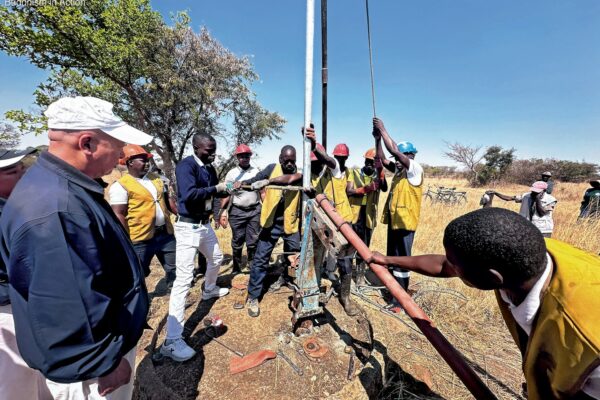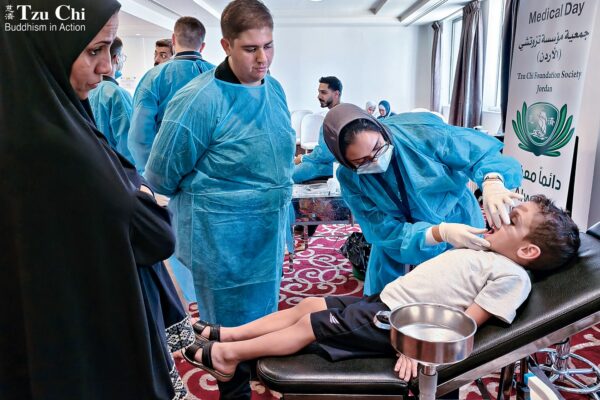Information provided by Ya-Chi Yuan
Compiled by Ji Shu-zhen
Translated by Wu Hsiao-ting
Photos courtesy of Tzu Chi volunteers in Eswatini
A Tzu Chi volunteer’s house had collapsed amidst heavy rains, tragically resulting in the death of her husband. Her fellow volunteers decided to quickly build a new one for her family, so that her husband’s coffin could return to a complete home.
Emma Dlamini, 65, lives in a rural area in Manzini, central Eswatini, the African country formerly known as Swaziland. She is a Tzu Chi volunteer and helps run a hot meal station in her community, providing food for orphans. Eswatini currently has 84 Tzu Chi hot meal stations like hers. They were established after Tzu Chi volunteers from Durban, South Africa, started visiting the nation in 2012, encouraging local people to take up charity work and care for their countrymen in need. These stations now serve more than 3,500 orphans and destitute families across the country. Emma has been in charge of her hot meal station for years. She provides hot food every Saturday or Sunday, rain or shine.
The rainy season in Eswatini runs every year from October to March. People there are used to heavy rains that last several months in a row, but this year’s rainy season was uncommonly long and characterized by heavier precipitation than usual. On January 13, 2022, driving rain again began to fall in Manzini. That night, Emma’s entire family was gathered in their living room watching TV, when Emma’s husband, Simon, said, “I’m tired. I’m going to go to bed.” He then retired to his room.
Some time later, a deafening crash shook the house and shocked everyone in the living room out of their skin. They dashed to Simon’s room to check on him and discovered to their horror that parts of the walls there were completely gone. Even worse: there was no sign of Simon.
Days of heavier-than-normal rains had caused their roof to cave in and parts of their walls to collapse. Simon and his bed had been buried in the collapse. Everyone quickly set to work removing the rubble. After a lot of effort, they finally extracted him and rushed him to the hospital.
Simon was in awful shape, his vital signs weak. Emma was not injured, but was so badly shaken by the accident that she was also admitted to the hospital for observation. Her family was rattled to the core. It was like a waking nightmare.
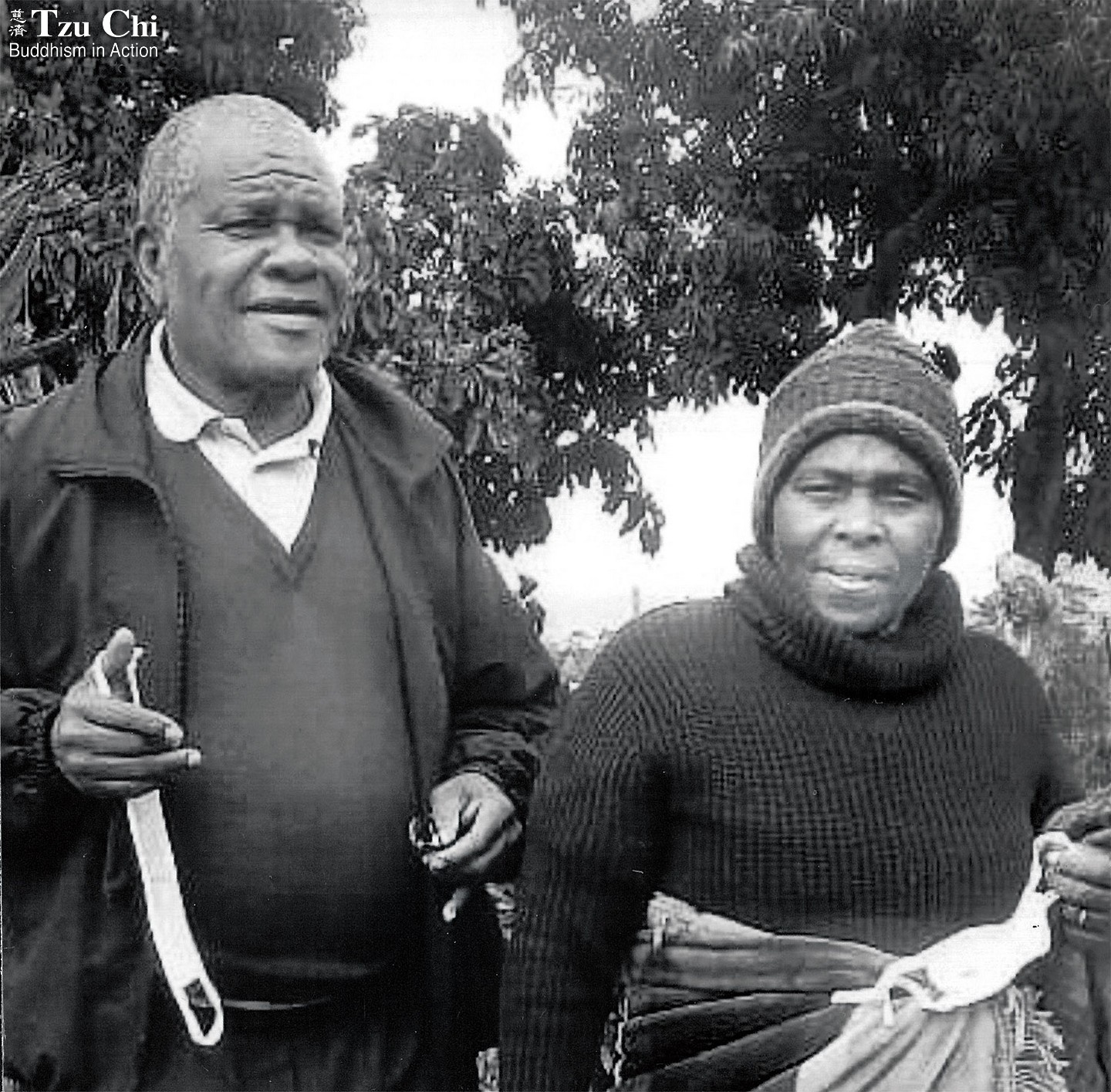
Simon Dlamini (left) stands next to his wife, Emma. Though of limited means, Simon showed strong support for Emma’s volunteer work serving hot meals to orphans in their community.
Caring for kids in the community
Emma’s fellow Tzu Chi volunteers went to the hospital on January 15 to check on her and her husband. Simon was seriously injured, his bones fractured. Wearing an oxygen mask and attached to an IV drip, he looked very weak.
Despite his dire condition, Simon was deeply moved by the volunteers’ visit. Mustering all his strength, he said to them, “I’ve always been very supportive of my wife’s volunteer work with Tzu Chi. I told her to devote herself entirely to Tzu Chi and not to spend time on other organizations. I’ve ‘donated’ her to Tzu Chi.”
As frail as he was, he only talked about Tzu Chi, not his injuries or himself. This really touched a chord in the volunteers. Everyone chipped in for an emergency cash gift for the couple to convey their best wishes to them. They scraped together 600 Swazi lilangeni (US$38) and presented it to Emma.
The next day, volunteers arrived at Emma’s home to find out how badly the house was damaged. They found the family busy moving and clearing away stuff. Only then did they learn that Emma lived with her son, daughter, and six grandchildren, one of whom was mentally disabled. Emma had never revealed to her fellow volunteers that she had a developmentally delayed grandson.
The volunteers felt nothing but respect and admiration for Emma when they saw all she had to care for at home. Even though she had grandchildren to take care of—including one that required special care—she still took charge of the hot meal station to provide food for underserved kids in her community.
Looking at the damaged house, the volunteers asked Emma’s family if there was anything they could do to help. That’s when they got the news that none had expected: Simon had passed away that morning in the hospital.
When they had first stepped into the house that day, the volunteers had seen the family hard at work, tidying things up and clearing away stuff. But with the bad news, they realized the family was getting the house ready for the upcoming funeral. Tears welled up in everyone’s eyes.
A complete home
“We must let Simon’s coffin return to a home with walls and a roof,” the volunteers decided. His funeral was scheduled to take place about a week later, so they didn’t have much time to get the work done.
According to traditions in Eswatini, a person’s body is moved to and kept in a mortuary when they first pass away. It is not sent home until the day before the funeral, which is usually set on the first Saturday after one’s death. A burial site near home is typically selected for the final resting place.
Eswatini has a poor economy. Unemployment is high and people are generally destitute. The native Tzu Chi volunteers there are no exception. Even so, everyone contributed generously to help with the construction project. The amount they gave varied, from a hundred lilangeni (US$6) to 500 (US$32), but each gave what they could. In the end, however, the money raised was still a long way from paying for the construction. To build a new home for Emma, they would need about 850 cinder blocks, 60 sacks of cement, two truckloads of sand and gravel, in addition to windows and doors. What should they do?
Though it had been two years since volunteers from Durban, South Africa, had visited Eswatini due to the COVID-19 pandemic, volunteers in the two countries had stayed in touch via the Internet. When Ya-Chi Yuan (袁亞棋), a volunteer in Durban, learned about the construction project, she proposed to let Tzu Chi make up the shortfall.
The volunteers in Eswatini declined the offer. “Don’t you worry about us,” they said with determination. “We’ll figure a way out. Tzu Chi has been in Eswatini for ten years. We’ll show you we can stand on our own. We’ll work through this together.”
True to their word, they set to work. Without wasting any time, they contacted Eswatini’s Disaster Management Department and Mr. Kareem Ashraff, the Honorary Consul General of Indonesia, who had been very supportive of Tzu Chi. Mr. Ashraff and the government officials the volunteers talked to were touched when they learned about Emma’s story. In the end, the government decided to donate cinder blocks, cement, and other essential building materials to help. The construction materials were delivered to Emma’s home on January 17.
Construction started the next day on a vacant lot next to Emma’s home, with volunteers pitching in for the work. They started by digging the foundation for the new house.
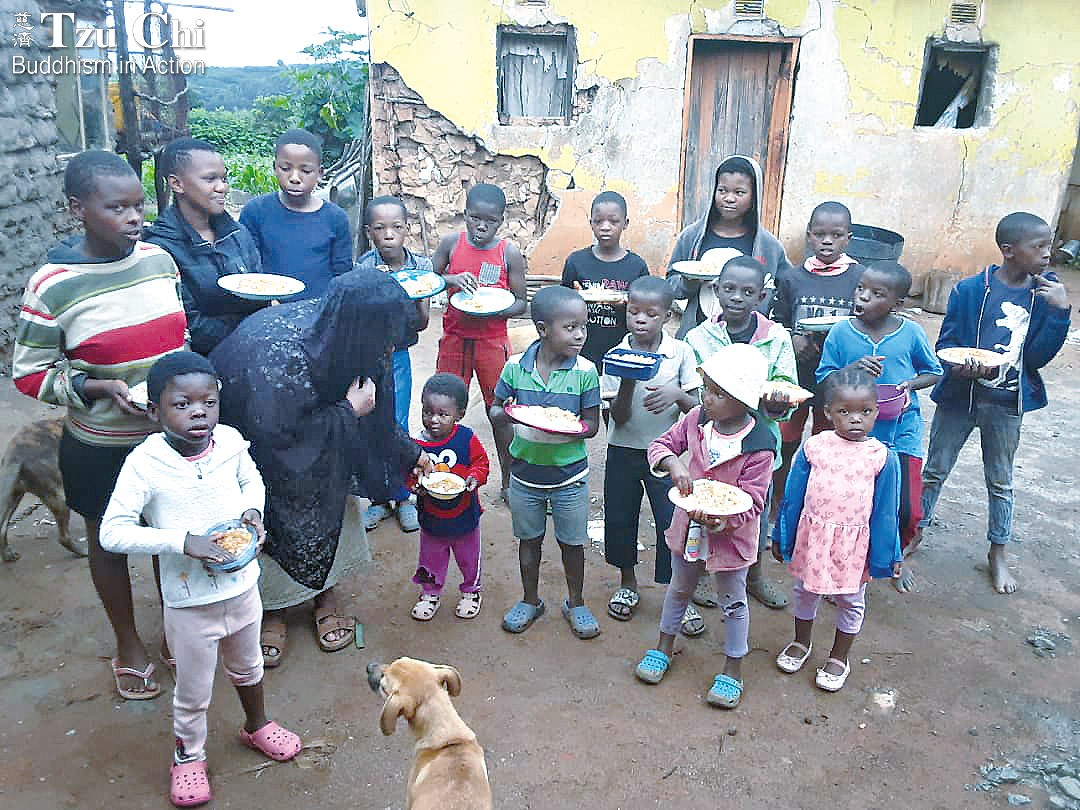
After Simon passed away in January this year, Emma resumed her meal service while still in her mourning period.
Back to work soon
“I have no money nor strength to help with the building of the house,” said volunteer Rodah Mthembu, 74, “but I still want to help. May I go over to Emma’s place? May I?”
“Come over quickly,” replied the volunteer who received Rodah’s phone call. “We really need you here to keep Sister Emma company.”
While others were busy with the construction, Rodah stayed indoors with Emma, chatting with her, keeping her from feeling lonely or sad, and making her feel warm at heart.
During break time at noon, all the volunteers gathered around Emma, talking and laughing together. The happy atmosphere warmed Emma and her family’s hearts.
In addition to the volunteers who worked in shifts during the project, Emma’s son and three male volunteers who were skilled in construction worked every day, from morning to night, to speed the completion of the house. The project went smoothly, and in five short days, a sturdy house was ready to welcome the family.
Simon’s coffin arrived at the new home on January 22. The following day, volunteers draped a blanket they had purchased together over the coffin. With the help of a few male volunteers, Simon was buried next to his home.
According to Swazi customs, women are required to stay housebound for a month after their spouses pass away. They also have to observe a year of mourning, during which time they can’t travel far from home. But because Simon had said he had “donated” Emma to Tzu Chi, their children and other family members agreed that Emma could shorten her mourning period to half a year so that she could participate in Tzu Chi work. They only asked that Emma cover her head and face with a black cloth when she went out.
To everyone’s surprise, Emma’s hot meal station reopened on January 29, just 13 days after her husband had passed away. With her daughter’s help, she continued providing hot food for children in the community.
Everyone was impressed. Emma had had a difficult time, what with the collapse of her old home and the sudden passing of her husband, and yet she was able to pull herself together in just two weeks and get her life back on track so soon.
After the funeral, volunteers painted the outer walls of Emma’s new home. Then, on February 4, they held a simple ceremony to inaugurate the house. They arrived at her home early that day to give it a good cleanup before hanging new curtains and cutting a ribbon. Tying the keys to the house with a ribbon to the front door, they officially turned the house over to Emma. It was a simple ceremony, but full of love.
Without a doubt, love from her fellow volunteers and support from her late husband will help keep Emma going as she continues her volunteer work for Tzu Chi.
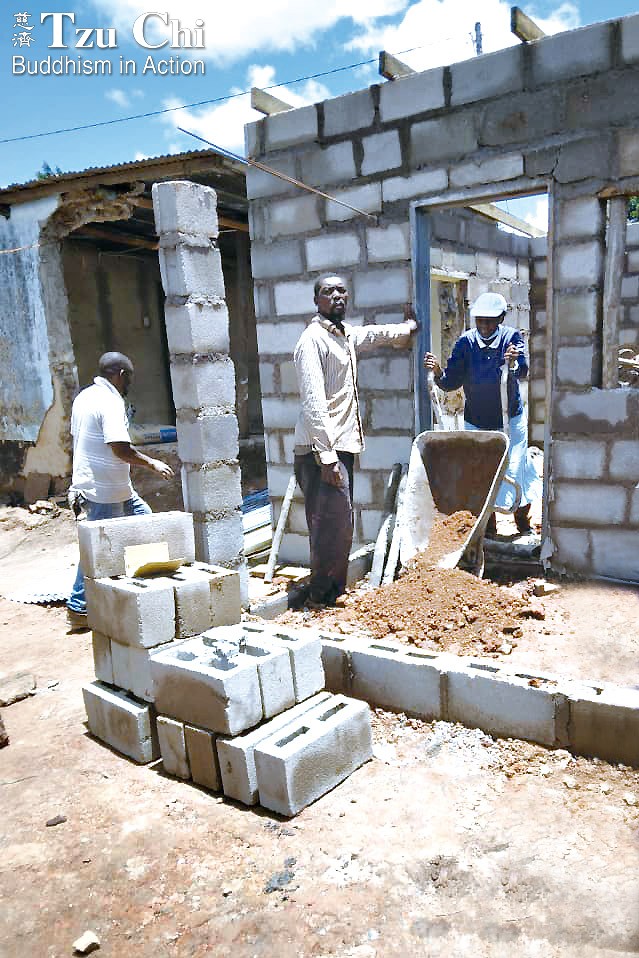
The house volunteers built for Emma was made of cinder blocks and concrete, making it a lot stronger than a local mudbrick house.


